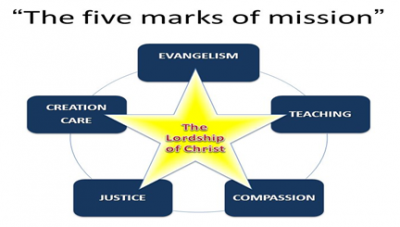 Report by Rev. Trevor Sargent, (deacon), Tullow Group of Parishes, Leighlin
Report by Rev. Trevor Sargent, (deacon), Tullow Group of Parishes, Leighlin
The Anglican Communion worldwide, between 1984 and 1990, agreed a five point summary of the Church’s mission, known as ‘The Five Marks of Mission’. These five points were the focus of a presentation on Wednesday, 16th September in Castleknock Parish Centre in west Dublin, chaired by Rev. Dr William Olhausen, (Ballybrack, Dublin).
The Five Marks of Mission are:
- To proclaim the Good News of the Kingdom (speaker: Rev. Jack Kincaid, Wicklow)
- To teach, baptise and nurture new believers (speaker: Rev. Lesley Robinson, Clontarf, Dublin)
- To respond to human need by loving service (speaker: Rev. Philip McKinley, DCU Chaplain)
- To transform unjust structures of society, to challenge violence of every kind and pursue peace and reconciliation (speaker: Canon Paul Houston, Castleknock, Dublin)
- To strive to safeguard the integrity of creation, and sustain and renew the life of the earth (speaker; Mr David Ritchie, Sec. Gen. RCB)
Naturally, the Fifth Mark is of interest to anyone involved with Eco-Congregation Ireland, but as ecology is the study of the interconnectedness of all life and all disciplines, each Mark of Mission has a bearing on the others. For example, to talk of God’s Kingdom is to involve all creatures, (Romans 8:21). Also, human need, injustice and the integrity of creation are evidently all impacted by chaotic climate change, loss of biodiversity and scarcity of finite resources like potable water.
Mr. David Ritchie, the Secretary General of the Representative Church Body, (the administrative centre of the Church of Ireland), who spoke specifically about the Fifth mark, quoted the former Archbishop of Canterbury, Rowan Williams, who declared that ‘climate change impels us to think of God’s justice and how we are to echo it in the world’.
The imperative for Christians to give effect to the Fifth Mark is no more and no less biblically rooted than each of the other four marks. Mr. Ritchie reminded the meeting that God expressed satisfaction after creating all life, ‘God saw all that he had made, and it was very good’, (Genesis 1:31). The psalm writer strikes a similarly ecological note, exclaiming, ‘LORD, our Lord, how majestic is your name in all the earth!’, (Psalm 8:9).
In a discussion on the Fifth Mark after the presentations, a view was expressed that whilst studying the Bible is an essential way to get know more about God, (Psalm 119:18), the people of God also should learn to closely observe their fellow creatures. Beyond the written words of God’s revelation in the Bible, life in all its biodiversity is also a revelation of God’s creative genius and grace. God is revealed both in his Word and in the cosmos he created and sustains. As with the interdependent Five Marks of Mission, study of both God’s Bible and God’s biodiversity are mutually enriching experiences.
